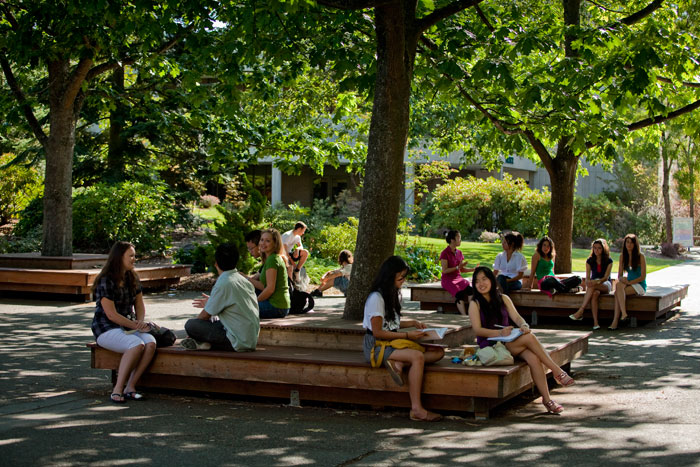 Edmonds Community College Edmonds Community College
20000 68th Avenue West
Lynnwood, WA 98036
425.640.1459 | www.edcc.edu/about
Established in 1967, on 50 acres in Lynnwood, Wash., the site of a World War II era Army radio station, the college has longstanding construction, horticulture, paralegal, and parent education programs. It has partnered with Central Washington University since 1975 to offer bachelor’s degrees locally. Opportunities for learning and service provided by the college include: 17 National Science Foundation grants, service-learning projects with 57 community partners, and more than 75 cultural events for the public each year.
The college serves: 20,000 students each year with a students-to-instructor ratio of 24:1 including: 2,200 students (aged 18 to 82) annually in its adult literacy programs; 1,589 international students from 70 countries; and 5,000 students in online or hybrid classes. 81 percent of our students live within eight miles of campus. Source: 2009-10 academic year data
Accreditation
Edmonds Community College is accredited by the Northwest Commission on Colleges and Universities and governed by the Washington State Board of Community and Technical Colleges.
Our Mission and Core Themes
Edmonds Community College is a leader in providing quality opportunities for learning and service, responding to the dynamic needs of our diverse community.
Core Themes:
- Foster Student Learning
- Provide Access for Educational Opportunities
- Support Student Success
- Provide a Positive Place to Work and Learn
- Support Community and Civic Engagement
- Be Fiscally Accountable
Our Philosophy
Edmonds Community College is a community of learners, which upholds integrity and high educational standards and affirms the value of lifelong learning, community engagement, and sustainability. We strive to serve the needs of the individual and honor diversity of culture, ethnicity and thought. We see education as a collaborative process, valuing innovation, change and accountability.
Points of Interest
Sustainability
Committed to thinking, teaching and living green, our college added sustainability to its philosophy in 2006. It includes improvements to college operations aimed at fiscal accountability such as energy efficiencies in campus facilities, community events and partnerships, and curriculum such as green jobs training in Restoration Horticulture and Energy Management as well as a strong service-learning program which works with 57 community partners and includes the Learn-and-serve Environmental Anthropology Field (LEAF) school (a series of Human Ecology I Human Ecology II Human Ecology III classes).
STEM
A hub of science, technology, engineering, and math training in its community, our college has received 17 National Science Foundation grants. We house the National Resource Center for Materials Technology Education, which provides curriculum resources for materials technology nationwide, and an advanced technology lab, and operate the Washington Aerospace Training and Resource Center. We offer undergraduate science research projects and community events aimed at increasing interest in science studies. We work to increase the numbers of women and underrepresented minorities studying science in programs such as our Mathematics, Engineering, Science Achievement Center.
Access to bachelor’s degrees
We have worked with Central Washington University since 1975 to provide bachelor’s degrees locally and strive continuously to improve our model. Most recently, we’ve added dual admission and articulations with CWU-Lynnwood’s Bachelor of Applied Science-Information Technology degree so that students earning a two-year Associate of Applied Science-T degree in career-training programs at our college — such as Event Planning, Culinary Arts, and Energy Management — can then earn their bachelor’s degree from CWU on our campus. With an average of 5,000 students taking online classes each quarter, we also provide access to bachelor’s degrees online via partnerships with Washington State University, Western Governors University Washington, and the University of Washington. |




 Print this Page
Print this Page Edmonds Community College
Edmonds Community College